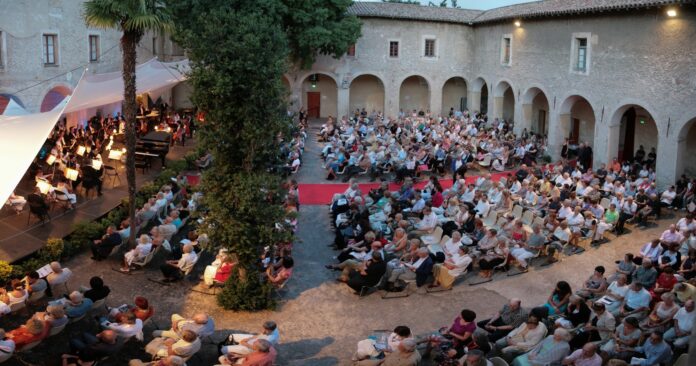The Nice Classic Festival ends on August 9 after three weeks of concerts blending classical music, sound creations, and young talent. This edition pays tribute to the sea, in connection with this year’s theme in Nice.
Since July 22, the Nice Classic Festival has been unfolding its program between heritage sites and intimate atmospheres. This 2025 edition, culminating on August 9, is part of the Year of the Sea, launched this year on the occasion of the United Nations Ocean Conference which was held in Nice. Under the artistic direction of Marie-Josèphe Jude, a renowned pianist and educator, the festival connects music, nature, and ecological consciousness.
More than twenty concerts have punctuated these three weeks. Iconic works by Vivaldi, Ravel, or Satie have interacted with sound creations of our time. The Nice Summer International Academy, celebrating its 68th edition, plays a central role: its young musicians are present at every stage. The ambition is clear: to create a space for transmission, encounter, and emotion while remaining accessible.
“The crème de la crème of French musicians in recital, chamber music, also featuring the Philharmonic Orchestra of Nice, to resonate with iconic works linked to nature by Ravel, Satie, Vivaldi, Boulez… and many others!” emphasized Marie-Josèphe Jude.
An end to the festival under the sign of immersion
This Thursday, August 7, marks a turning point in the programming. At noon, David Saudubray will give a piano recital at the Matisse museum. In this quiet, air-conditioned place, the audience can hear two major cycles of German Romanticism: Brahms’ late-life Klavierstücke and Schumann’s Kreisleriana, a nervous and haunted work.
At 5 p.m., the atmosphere changes at the Conservatoire de Nice. Two electroacoustic pieces will be offered in an immersive listening experience. First, Requins by Michel Pascal. Designed in the 1990s for the giant aquarium of Nausicaa, this work evolves in a 360° sound space with 32 audio tracks. The audience, positioned at the center, can modulate the sound environment, create depth, or exploding effects. Sounds of waves, bird cries, and electronic layers envelop the listeners in a shifting landscape, between tension and calm.
The second work, Underwater Theories, by Theodoros Lotis, adapts a 2002 stereo composition to the same setup. This piece questions the distribution of sound in space, playing with textures, masses, and bursts. The music sometimes seems to distance itself, come closer, or dissolve. It opens mental images akin to light or wind.
Denis Smalley, a musicologist, wrote about this work: “we accumulate a mental image of space and vastness as we observe these behaviors and absorb the accretion of these microcosmic details.” A way to view music as a sensitive exploration of the world.
The day concludes at 8 p.m. at the cloister of Cimiez Monastery with Chemins de Saisons, a program around Piazzolla’s Cuatro Estaciones Porteñas. The venue, rarely open to the public, offers natural acoustics ideal for chamber music. The artists – Pierre Génisson on clarinet, Geneviève Laurenceau on violin, Julien Beaudiment on flute, Delphine Haidan on vocals, Alaïa Michon on accordion, and Marie-Josèphe Jude on piano – alternate between lyricism and tango rhythms. The cloister becomes, for an evening, a crossroads between Argentina and the Mediterranean.
Last days between romanticism and transmission
On Friday, August 8, back to solo piano at 12 p.m. at the Matisse auditorium. Gaspard Dehaene’s recital, focused on Chopin, promises a suspended moment: waltzes, nocturnes, and scherzos follow each other for an hour.
At 8 p.m. on the same day, the festival presents The Night of the Piano at the Cimiez cloister. Five pianists – Pascal Rogé, Elena Font, Akiko Ebi, François Chaplin, and Johan Schmidt – take turns in a program where Debussy, Rachmaninov, and Ravel make their contrasting voices heard. The event closes with Mother Goose, Ravel’s musical tale. The last movement, The Fairy Garden, draws the curtain on a world of images and sounds.
On Saturday, August 9, at 6 p.m., the closing concert will bring together the students of the Summer Academy at the cloister. Entry is free. This annual rendezvous reveals the young performers trained during the master classes. Piano, violin, flute, guitar, or singing, all disciplines are represented.
The festival’s pricing policy remains true to its commitment to openness. All concerts are free for those under 25. An Ultimate Pass for €150 allows access to all events. For others, prices range from €15 to €29, depending on the venues and formats. Tickets are available on the Nice Classic Festival site. Reservations are made on the Hello Asso website.
To music adds the local art of living. The festival honors Nissarde Cuisine, with the support of the official label, and offers wines from Château Roubine. Partnerships that extend the experience, between taste, listening, and sharing.
The festival’s heritage anchoring, the presence of the sea as a common thread, and the diversity of forms – from recitals to immersive installations – make the Nice Classic Festival both an exacting and open event. An invitation to listen differently.


